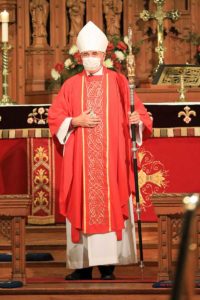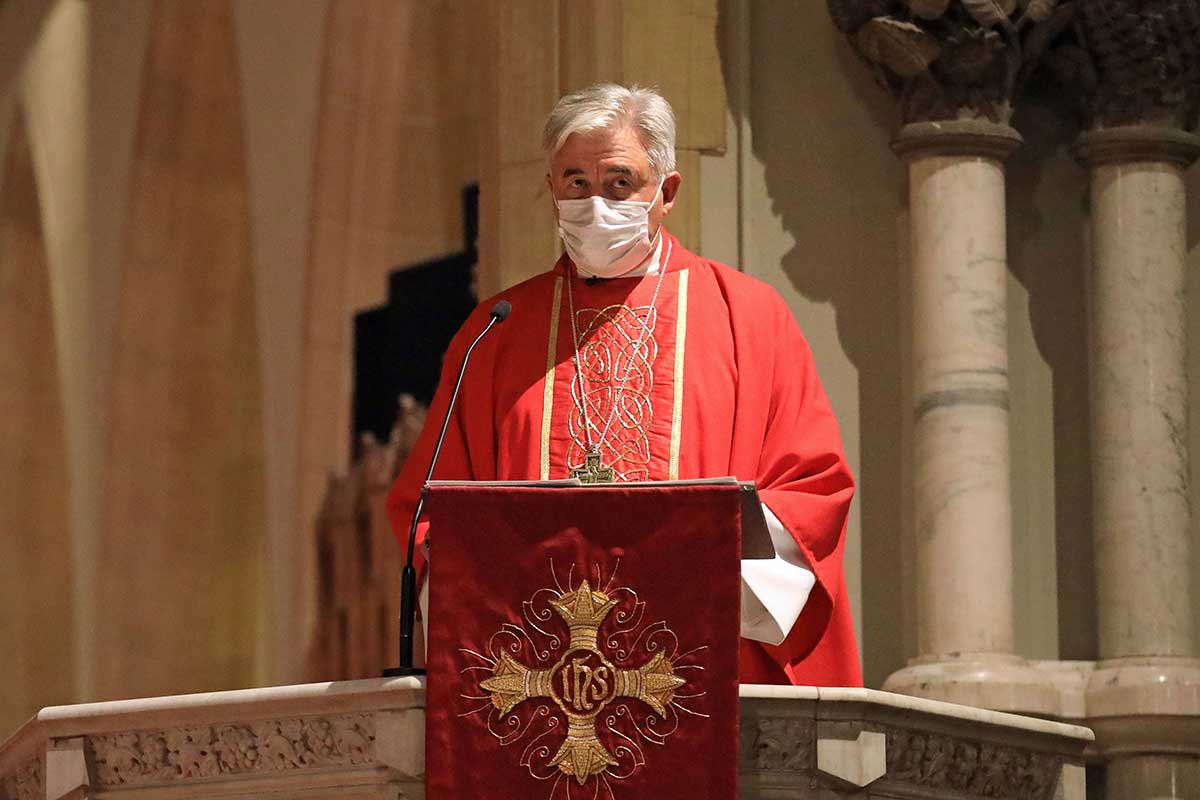Delivering his charge to the Synod at the opening Eucharist Service on Oct. 28 at Christ Church Cathedral in Ottawa, Bishop Shane Parker encouraged Anglicans throughout the diocese to find comfort and inspiration in the reading from the Gospel of John (15: 17-27)
“Like Saint Simon and Saint Jude, we belong to a generation who must look ahead to the future in a new way,” the bishop said. “We live in a time where the past we have known is giving way to a future we must give shape to. And we, too, must trust that God the Holy Spirit is already in our future, and be confident and faithful as we move forward.”
The year 2021 marked the 125th anniversary of the founding of the Anglican Diocese of Ottawa, but as has been broadly recognized, the church is in a very different place in the present-day secularized society than the position of power and influence it once held.
Bishop Parker said the work for this generation “is to break free from structures which hold us to a time that has passed, and to be visionary and courageous as we face the future.”
To that end, the bishop said he prays that “we will fully embrace what it means to be a diocesan church and see ourselves as collectively strong, resilient, and resource-filled. I believe our future depends on doing so.”
Strategic Priorities
In his charge to Synod in 2020, the bishop had highlighted four strategic priorities, and this year’s charge charted progress made in each of them
Communications has been the top priority. “The Episcopal Communications Panel has prepared a comprehensive strategic plan, and is working closely with our director of communications and stewardship and her staff to implement it,” he said. “Significantly, the panel advised retaining a professional agency to work with us to rebrand our diocese,” which he announced would be officially launched during the online meeting of Synod on Oct. 30. (see story p. 11)
The second strategic priority concerns the shape of parish ministry and buildings.
The bishop thanked the Shape of Parish Ministry Consultation (SPMC) Team, who have spent many hours in conversation with every congregation in the diocese creating profiles of every parish.
“Stage II of the consultation will move us from description to analysis, as we together review all parish profiles and consider what we are seeing—and what the Holy Spirit is calling us to see. Stage III of the consultation will move us from analysis toward making concrete proposals—leading to consensus decision-making at our next Synod,” he explained.
“Undergirded by common prayer, let us, as bishop, clergy, and people, courageously address the urgent questions facing us, and let us creatively use our collective resources to give new shape to our parish ministries so they can thrive.”
The third and fourth strategic priorities are engagement with the world and lifelong learning.

Bishop Parker said that the Governance Committee is conducting a governance review, with particular emphasis on those parts of committee structures not adequately suited to supporting and achieving these two priorities. The review, he noted, “will see us being more intentional in building partnerships with other groups who seek engagement with the world in proactive, Christ-like ways.”
The education committee proposed in the governance review “will seek out or develop resources to enable all of us to be equipped to address the insidious and dehumanizing effects of racism.”
In the meantime, we must continue to make space to hear Indigenous, Black, Asian, and other racialized peoples speak of how racism cuts into self-esteem, safety, and opportunity.” Already underway is Project Anti-racism, which began during this past summer. It is a mandatory awareness and capacity-building program for all clergy in parish ministries, all managers in community ministries, and senior staff. “Once our key leaders have completed Project Anti-Racism training early next year, they will be charged with bringing what they have learned to every ministry context,” Bishop Parker explained.
The pandemic
The bishop also spoke about how the pandemic has affected everyone in the diocese and its continuing impacts. “The Holy Spirit has spoken to us during the coronavirus pandemic, causing us to see how rates of infection, mortality, and vaccination are affected by grossly uneven distributions of wealth and power, locally and globally; and how generosity, justice, and compassion can bring relief, equity, and healing. I pray the Holy Spirit will continue to guide us more deeply into the experience of those of us who constantly live with deprivation and restrictions—and through our parish ministries and community ministries to find new ways to accompany and assist all our siblings who live precariously.”
He expressed his profound gratitude “to all our clergy, lay leaders, and staff in our parish and community ministries, and to our senior staff for being responsive, careful, and undaunted as we have implemented and often revised our pandemic plan.” He acknowledged that the pandemic has caused real stress and fatigue and encouraged them to take care of themselves “and one another, keeping things as simple as possible and setting a sustainable pace.”
The bishop added, “I am deeply thankful for all the people of our diocese, who have, with much good will, supported the restrictions and changes which had to be imposed.”



An abiding sense of thanksgiving